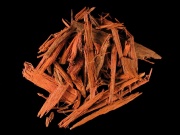Difference between revisions of "Brazilwood"
m (Text replace - "== Authority ==" to "== Sources Checked for Data in Record ==") |
|||
| Line 1: | Line 1: | ||
| − | [[File: | + | [[File:Violin bow 198723.jpg|thumb|Violin Bow<br>MFA 1987.23]] |
== Description == | == Description == | ||
Any of several tropical trees of the senna genus, ''Caesalpinia'', such as ''C. brasiliensis'' (from Brazil), ''C. crista'' (from Pernambuco), ''C. echinata'' (peachwood from Nicaraugua), or ''C. sappan'' (sappanwood from East Indies and Asia). Brazilwood was an important wood and dye export from South America beginning in the 17th century. Its hard, red-color wood has had limited use for violins, bows, veneer and high quality furniture. It accepts a high polish. The wood contains the colorant [[brasilin]], a hydroxyanthraquinone, that gives a deep red to brownish color. [[Brazilwood dye]], has been used for textile and leather dyes, inks, paints, varnish tints and wood stains. | Any of several tropical trees of the senna genus, ''Caesalpinia'', such as ''C. brasiliensis'' (from Brazil), ''C. crista'' (from Pernambuco), ''C. echinata'' (peachwood from Nicaraugua), or ''C. sappan'' (sappanwood from East Indies and Asia). Brazilwood was an important wood and dye export from South America beginning in the 17th century. Its hard, red-color wood has had limited use for violins, bows, veneer and high quality furniture. It accepts a high polish. The wood contains the colorant [[brasilin]], a hydroxyanthraquinone, that gives a deep red to brownish color. [[Brazilwood dye]], has been used for textile and leather dyes, inks, paints, varnish tints and wood stains. | ||
| − | [[File:brazilwood raw.jpg|thumb|Brazilwood | + | [[File:brazilwood raw.jpg|thumb|Brazilwood (''Caesalpinia brasiliensis'')]] |
| − | + | [[File:brazilwood_powdered_1.jpg|thumb|Powdered brazilwood (''Caesalpinia brasiliensis'')] | |
| − | (''Caesalpinia brasiliensis'')]] | ||
| − | |||
== Synonyms and Related Terms == | == Synonyms and Related Terms == | ||
| Line 14: | Line 12: | ||
Other varieties include Lima wood (Peru); California wood, Jamaica wood; Bahia wood; Sierra firma wood | Other varieties include Lima wood (Peru); California wood, Jamaica wood; Bahia wood; Sierra firma wood | ||
| − | == | + | == Resources and Citations == |
| − | |||
| − | |||
| − | |||
| − | |||
| − | |||
| − | |||
| − | |||
* R.D. Harley, ''Artists' Pigments c. 1600-1835'', Butterworth Scientific, London, 1982 | * R.D. Harley, ''Artists' Pigments c. 1600-1835'', Butterworth Scientific, London, 1982 | ||
Revision as of 14:30, 30 June 2020
Description
Any of several tropical trees of the senna genus, Caesalpinia, such as C. brasiliensis (from Brazil), C. crista (from Pernambuco), C. echinata (peachwood from Nicaraugua), or C. sappan (sappanwood from East Indies and Asia). Brazilwood was an important wood and dye export from South America beginning in the 17th century. Its hard, red-color wood has had limited use for violins, bows, veneer and high quality furniture. It accepts a high polish. The wood contains the colorant Brasilin, a hydroxyanthraquinone, that gives a deep red to brownish color. Brazilwood dye, has been used for textile and leather dyes, inks, paints, varnish tints and wood stains.
[[File:brazilwood_powdered_1.jpg|thumb|Powdered brazilwood (Caesalpinia brasiliensis)]
Synonyms and Related Terms
Caesalpinia; brazil-wood; Brazil wood; brasilwood; brasil; pernambuco wood; pernambucco wood; fernambuco wood; peachwood; Santa Martha wood; bois du Brésil (Fr.); bois de Pernambouc (Fr.);pernambouc (Fr.); pau brasil (Port.); sappanwood; Queen's wood; Nicaragua wood; Rotholz (Deut.); legno rosso (It.); Brasilete (Esp.); Braziliehout (Ned.); bresilwood; verzino;
Other varieties include Lima wood (Peru); California wood, Jamaica wood; Bahia wood; Sierra firma wood
Resources and Citations
- R.D. Harley, Artists' Pigments c. 1600-1835, Butterworth Scientific, London, 1982
- Matt Roberts, Don Etherington, Bookbinding and the Conservation of Books: a Dictionary of Descriptive Terminology, U.S. Government Printing Office, Washington DC, 1982
- Dictionary of Building Preservation, Ward Bucher, ed., John Wiley & Sons, Inc., New York City, 1996
- Van Nostrand's Scientific Encyclopedia, Douglas M. Considine (ed.), Van Nostrand Reinhold, New York, 1976
- Random House, Webster's Encyclopedic Unabridged Dictionary of the English Language, Grammercy Book, New York, 1997
- F. Crace-Calvert, Dyeing and Calico Printing, Palmer & Howe, London, 1876
- Judith Hofenk-de Graaff, Natural Dyestuffs: Origin, Chemical Constitution, Identification, Central Research Laboratory for Objects of Art and Science, Amsterdam, 1969
